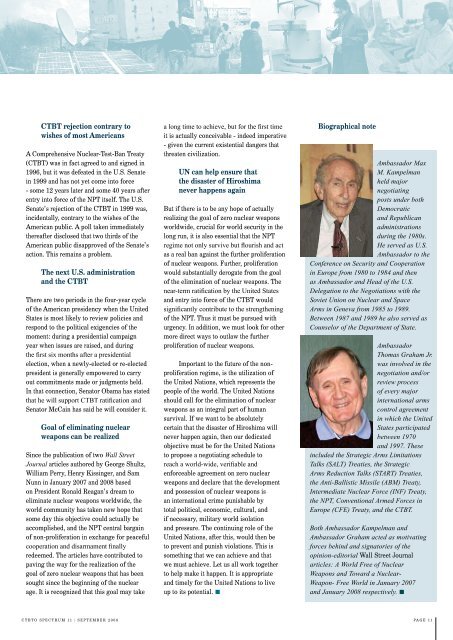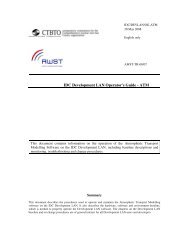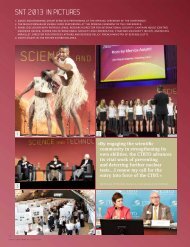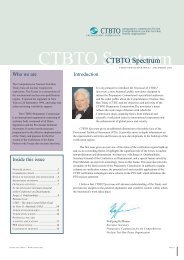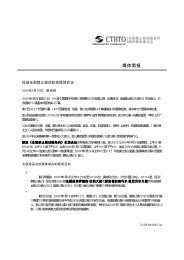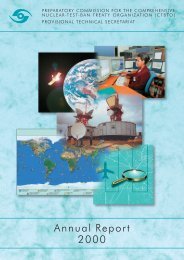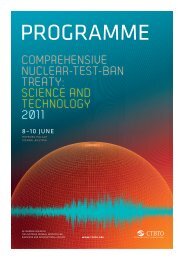Feature articleNuclear Weapons: An Existential Threat to Humanityby Max M. Kampelman and Thomas Graham, Jr.Sixty-three years ago last month, the beautifulcity of Hiroshima was devastated by theexplosion of an atomic bomb. The bombreleased the explosive equivalent of 12,500tons of TNT and killed – outright, or over timeby radiation poisoning – nearly 75 percent ofthe population of that city. Three days latersimilar devastation was brought to the cityof Nagasaki, and a few days after that, theSecond World War, the bloodiest and mostdestructive in the history of humanity, cameto an end.Capability to destroy theEarth several times overMany thought then, and in subsequent years,that the attacks on Hiroshima and Nagasakiwere the harbingers of the future and thatnuclear weapons were destined to spreadaround the world and be part of future wars,threatening the survival of humanity. Theseviews were reinforced by the commencementin a few years of a vast nuclear arms racewith both the United States and the SovietUnion rapidly developing the capability todestroy the Earth many times over.Over 40 States have capacityto build nuclear weaponsPresident John F. Kennedy was one of thosewho feared that nuclear weapons wouldinherit the Earth. There were predictionsduring his administration that, by the end ofthe 1970s, there could be as many as 15 to20 nuclear weapon States in the world, withnuclear weapons fully integrated into nationalarsenals. If this had happened, there wouldlikely be twice or more that many today. In2004, for example, the Director General ofthe International Atomic Energy Agency,Mohamed ElBaradei, asserted that there weremore than 40 States in the world that currentlycould build nuclear weapons, if they so chose.Such a development would have placed theworld community in a situation where everyconflict would run the risk of going nuclear andthere would be no way to keep nuclear weaponsout of the hands of terrorist organizations.Such an international security situation wouldhave made today’s time of troubles seem likeparadise by comparison.Nuclear Non-ProliferationTreaty prevents catastropheFortunately, such nuclear weapon proliferationdid not happen. President Kennedy’s darkestfears of catastrophe were not realized. Thechief reason that this did not happen wasthe entry into force of the Nuclear Non-Proliferation Treaty (NPT) in 1970, alongwith the extended deterrence policies of theUnited States and the Soviet Union. The NPTconverted what had been an act of nationalpride into an act of international outlawry.In 1960, after the first French nucleartest in the Sahara, the French newspapers wereoverflowing with nationalistic sentiment: “ViveLa France” and “Vive De Gaulle.” Switzerlandheld two national referenda and the Swisspublic twice voted to build nuclear weapons.Sweden had an active nuclear weapons researchprogram. After the NPT was in force, however,when India conducted its first nuclear weapontest in 1974, they were condemned by the entireworld and they had to hasten to declare thattheir nuclear explosion was “peaceful.”184 non-nuclear weaponStates agree not to acquirenuclear weaponsThe NPT essentially drew the line where theworld was in 1970; it recognized five existingnuclear weapon States: the United States, theSoviet Union (Russia), Britain, France, andChina. It provided that the rest of the worldwould agree not to acquire nuclear weapons.And most of the world did agree to thatproposition. Today, 184 NPT non-nuclearweapon States are committed to this obligation.Non-proliferation in exchangefor nuclear disarmamentBut the NPT did not come as a free gift fromthe rest of the world to the five nuclear weaponStates; rather it is a strategic arrangementfounded on a central bargain. That bargainwas, and is, non-proliferation in exchange forthe sharing of peaceful technology and nucleardisarmament. Nuclear disarmament wasperceived by the non-nuclear weapon States asthe five nuclear weapon States agreeing overthe long term to negotiate away their nucleararsenals so that ultimately all States wouldreceive equal treatment under the NPT.A comprehensive nuclear test banSince it was recognized that this would takesignificant time, the non-nuclear weapon Statespressed the nuclear weapon States to agree tointerim measures to include a comprehensivenuclear weapon test ban, a prohibition onthe further production of nuclear explosivematerial, a significant world-wide reduction inthe number of nuclear weapons, and bindingobligations not to use nuclear weapons againstnon-nuclear NPT parties.None of these measures 40 years laterhas been realized. One of these measures,which was seen in 1970 as a sort of litmustest which would indicate whether or not thefive nuclear weapon States would, over time,live up to their side of the central bargainwas a comprehensive nuclear test ban, whichwas included in the preamble to the NPT.Review conferences failed several times overthe years because of disagreement over thisissue. When the NPT was made a permanenttreaty in 1995, there was a recommitment toconclude a test ban in one year - that is, by1996. The non-nuclear weapons States’ viewwas, and is, that, if they are going to give upnuclear weapons, the five nuclear weaponStates could at least agree to stop testingtheir weapons.pa g e 1 0 C T B T O S p e c t r u m 1 1 | S e p t e m b e r 2 0 0 8
CTBT rejection contrary towishes of most AmericansA Comprehensive Nuclear-Test-Ban Treaty(CTBT) was in fact agreed to and signed in1996, but it was defeated in the U.S. Senatein 1999 and has not yet come into force- some 12 years later and some 40 years afterentry into force of the NPT itself. The U.S.Senate’s rejection of the CTBT in 1999 was,incidentally, contrary to the wishes of theAmerican public. A poll taken immediatelythereafter disclosed that two thirds of theAmerican public disapproved of the Senate’saction. This remains a problem.The next U.S. administrationand the CTBTThere are two periods in the four-year cycleof the American presidency when the UnitedStates is most likely to review policies andrespond to the political exigencies of themoment: during a presidential campaignyear when issues are raised, and duringthe first six months after a presidentialelection, when a newly-elected or re-electedpresident is generally empowered to carryout commitments made or judgments held.In that connection, Senator Obama has statedthat he will support CTBT ratification andSenator McCain has said he will consider it.Goal of eliminating nuclearweapons can be realizedSince the publication of two Wall StreetJournal articles authored by George Shultz,William Perry, Henry Kissinger, and SamNunn in January 2007 and 2008 basedon President Ronald Reagan’s dream toeliminate nuclear weapons worldwide, theworld community has taken new hope thatsome day this objective could actually beaccomplished, and the NPT central bargainof non-proliferation in exchange for peacefulcooperation and disarmament finallyredeemed. The articles have contributed topaving the way for the realization of thegoal of zero nuclear weapons that has beensought since the beginning of the nuclearage. It is recognized that this goal may takea long time to achieve, but for the first timeit is actually conceivable - indeed imperative- given the current existential dangers thatthreaten civilization.UN can help ensure thatthe disaster of Hiroshimanever happens againBut if there is to be any hope of actuallyrealizing the goal of zero nuclear weaponsworldwide, crucial for world security in thelong run, it is also essential that the NPTregime not only survive but flourish and actas a real ban against the further proliferationof nuclear weapons. Further, proliferationwould substantially derogate from the goalof the elimination of nuclear weapons. Thenear-term ratification by the United Statesand entry into force of the CTBT wouldsignificantly contribute to the strengtheningof the NPT. Thus it must be pursued withurgency. In addition, we must look for othermore direct ways to outlaw the furtherproliferation of nuclear weapons.Important to the future of the nonproliferationregime, is the utilization ofthe United Nations, which represents thepeople of the world. The United Nationsshould call for the elimination of nuclearweapons as an integral part of humansurvival. If we want to be absolutelycertain that the disaster of Hiroshima willnever happen again, then our dedicatedobjective must be for the United Nationsto propose a negotiating schedule toreach a world-wide, verifiable andenforceable agreement on zero nuclearweapons and declare that the developmentand possession of nuclear weapons isan international crime punishable bytotal political, economic, cultural, andif necessary, military world isolationand pressure. The continuing role of theUnited Nations, after this, would then beto prevent and punish violations. This issomething that we can achieve and thatwe must achieve. Let us all work togetherto help make it happen. It is appropriateand timely for the United Nations to liveup to its potential. ■Biographical noteAmbassador MaxM. Kampelmanheld majornegotiatingposts under bothDemocraticand Republicanadministrationsduring the 1980s.He served as U.S.Ambassador to theConference on Security and Cooperationin Europe from 1980 to 1984 and thenas Ambassador and Head of the U.S.Delegation to the Negotiations with theSoviet Union on Nuclear and SpaceArms in Geneva from 1985 to 1989.Between 1987 and 1989 he also served asCounselor of the Department of State.AmbassadorThomas Graham Jr.was involved in thenegotiation and/orreview processof every majorinternational armscontrol agreementin which the UnitedStates participatedbetween 1970and 1997. Theseincluded the Strategic Arms LimitationsTalks (SALT) Treaties, the StrategicArms Reduction Talks (START) Treaties,the Anti-Ballistic Missile (ABM) Treaty,Intermediate Nuclear Force (INF) Treaty,the NPT, Conventional Armed Forces inEurope (CFE) Treaty, and the CTBT.Both Ambassador Kampelman andAmbassador Graham acted as motivatingforces behind and signatories of theopinion-editorial Wall Street Journalarticles: A World Free of NuclearWeapons and Toward a Nuclear-Weapon- Free World in January 2007and January 2008 respectively. ■C T B T O S p e c t r u m 1 1 | S e p t e m b e r 2 0 0 8Pa g e 1 1


